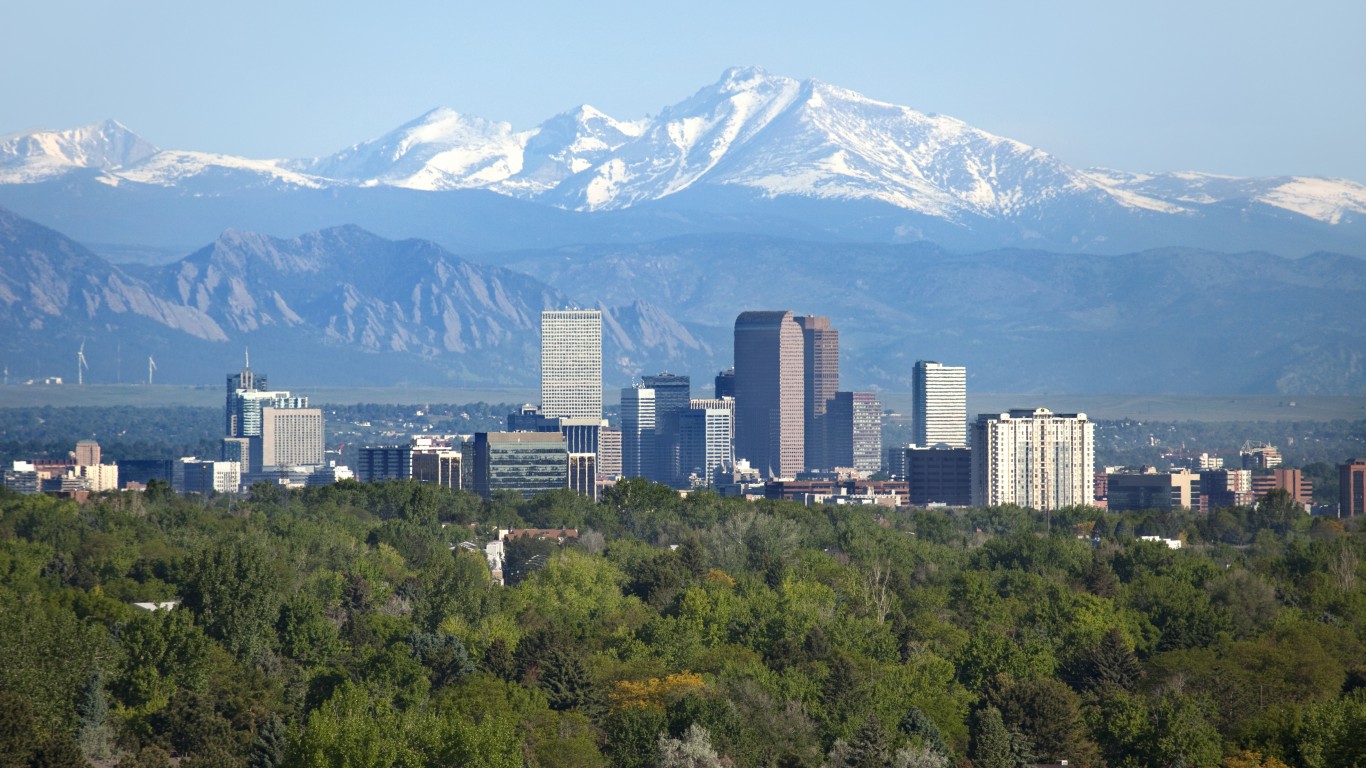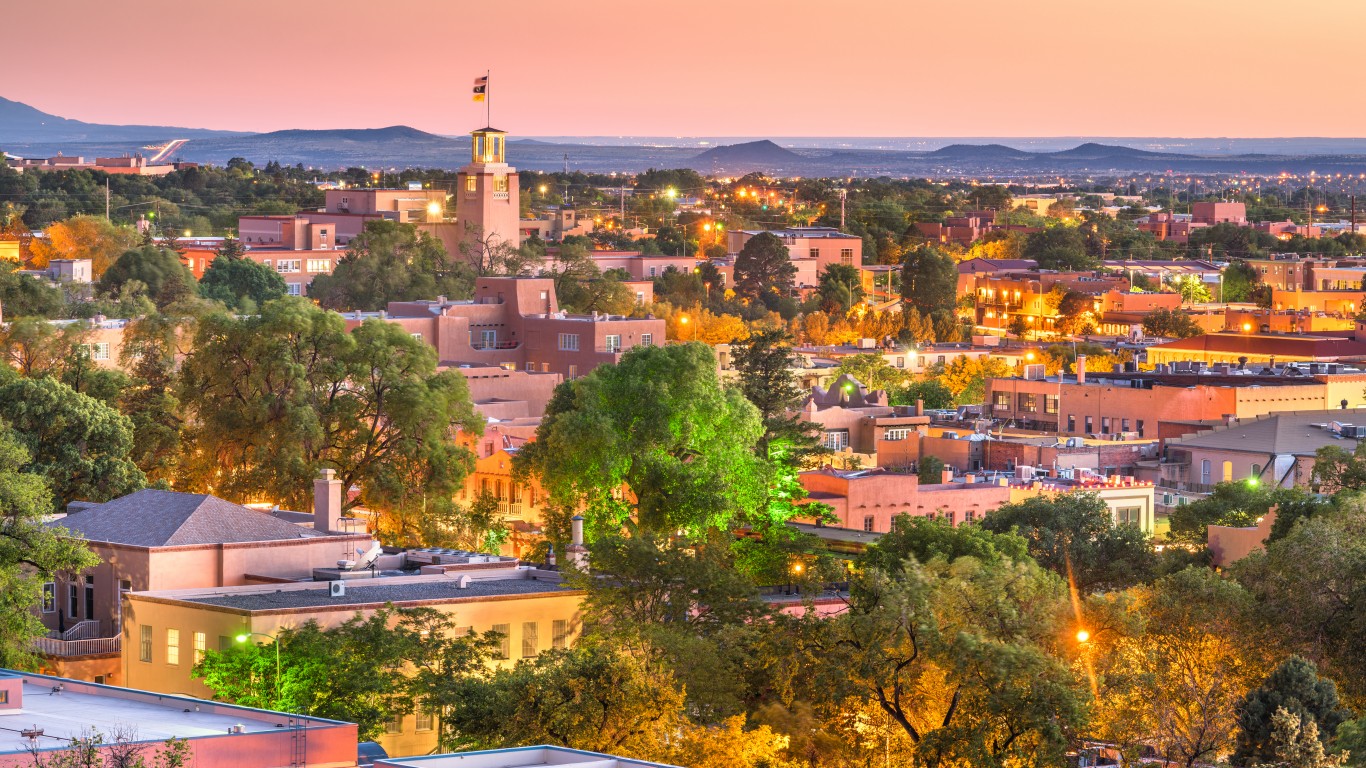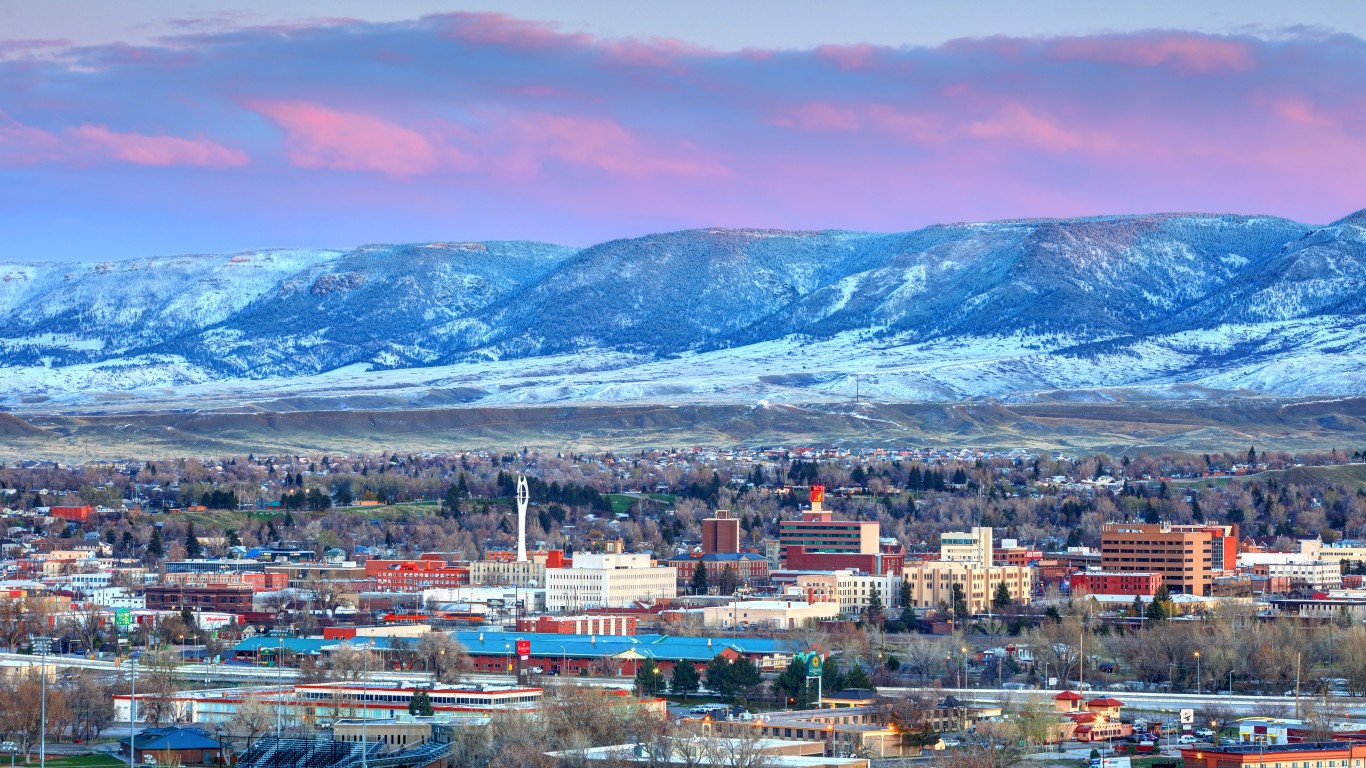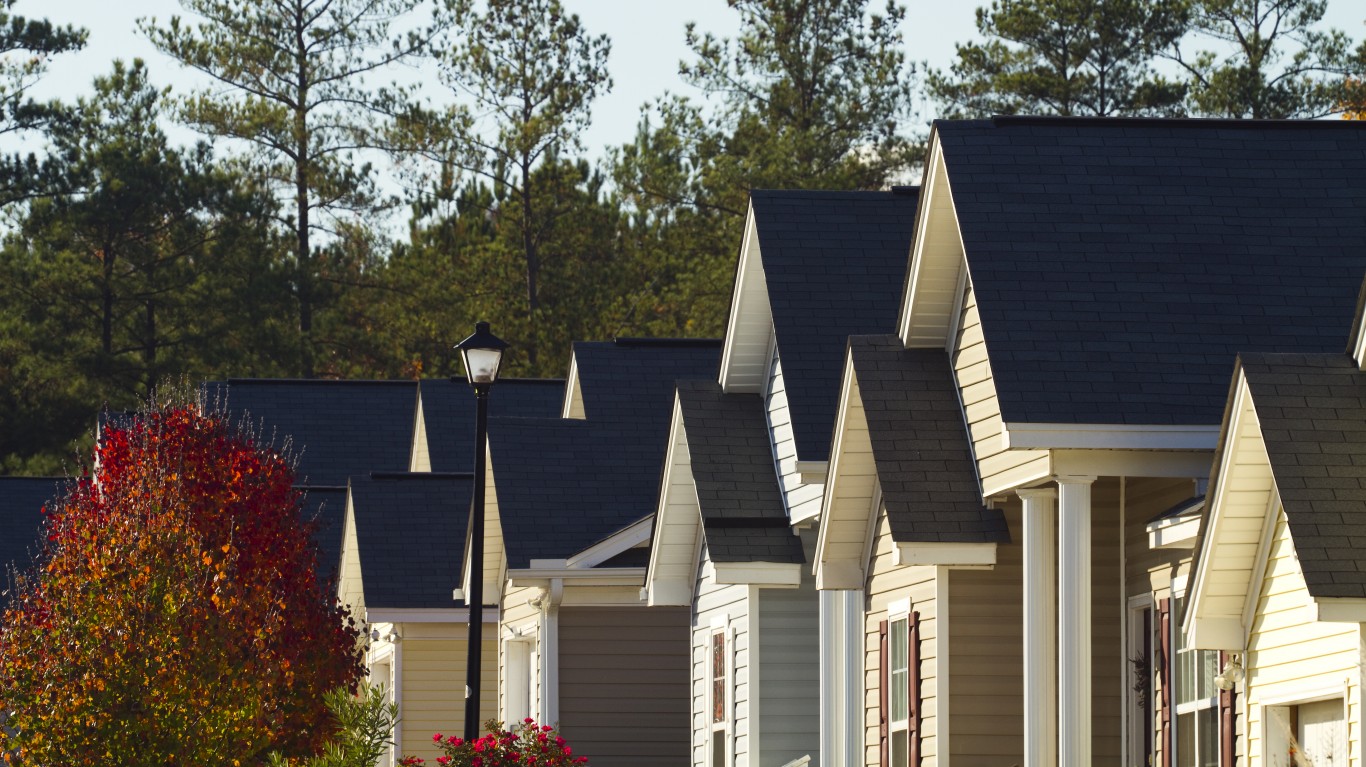
When it comes to personal finance, what it means to be “rich” is relative. Ask the 73.3 million minimum wage workers in the U.S. the income level they consider rich, and then pose the same question to the more than 700 American billionaires. Between the two groups, answers are bound to differ by orders of magnitude.
While there is no strict definition of what it means to be rich, there are some useful income benchmarks to compare how you stack up in the financial hierarchy. (This is how wealthy the middle class was the year you were born.)
Reviewing data from the U.S. Census Bureau’s 2021 American Community Survey on the minimum household income needed to be among the top 20% of earners, 24/7 Wall St. identified the income it takes to be considered rich in every state.
Nationwide, it takes an annual household income of at least $140,307 to be in the highest earning 20% of households. Depending on the state, households need to make anywhere from about $102,000 to over $180,000 to rank among the top 20% of earners. In most of the country, top earners bring in at least $60,000 more per year than the typical household and account for over half of all earned income.
To be among the highest earning 5% of households, annual incomes start anywhere from $175,500 to over $250,000, depending on the state. (These are the states where Americans make the least money.)
Generally, states where the threshold to be among the top 20% of earners is highest also tend to have a higher than average cost of living. In the 10 states where it takes the highest income to be considered rich, the cost of living is anywhere from 1% to 12% higher than the national average.
Click here to see the income it takes to be rich in every state.
Click here to read our detailed methodology.

Alabama
> Min. annual household income needed to be in the top 20% of earners: $111,735 (6th lowest)
> Income controlled by the top 20% of earners: 51.3% (13th highest)
> Min. annual income to be in the top 5%: $202,626 (6th lowest)
> Income controlled by the top 5%: 22.5% (22nd highest)
> Median household income: $53,913 (5th lowest)
> Cost of living: 10.7% lower than US avg.
[in-text-ad]

Alaska
> Min. annual household income needed to be in the top 20% of earners: $149,630 (12th highest)
> Income controlled by the top 20% of earners: 47.3% (2nd lowest)
> Min. annual income to be in the top 5%: $250,000+ (the highest — tied)
> Income controlled by the top 5%: 18.9% (the lowest)
> Median household income: $77,845 (12th highest)
> Cost of living: 3.2% higher than US avg.

Arizona
> Min. annual household income needed to be in the top 20% of earners: $132,268 (23rd highest)
> Income controlled by the top 20% of earners: 49.9% (22nd lowest)
> Min. annual income to be in the top 5%: $244,497 (22nd highest)
> Income controlled by the top 5%: 22.3% (23rd lowest)
> Median household income: $69,056 (20th highest)
> Cost of living: 0.9% lower than US avg.

Arkansas
> Min. annual household income needed to be in the top 20% of earners: $104,903 (3rd lowest)
> Income controlled by the top 20% of earners: 50.8% (18th highest)
> Min. annual income to be in the top 5%: $196,214 (3rd lowest)
> Income controlled by the top 5%: 22.5% (21st highest)
> Median household income: $52,528 (4th lowest)
> Cost of living: 10.8% lower than US avg.
[in-text-ad-2]

California
> Min. annual household income needed to be in the top 20% of earners: $173,547 (4th highest)
> Income controlled by the top 20% of earners: 52.4% (4th highest)
> Min. annual income to be in the top 5%: $250,000+ (the highest — tied)
> Income controlled by the top 5%: 23.6% (5th highest)
> Median household income: $84,907 (5th highest)
> Cost of living: 10.4% higher than US avg.

Colorado
> Min. annual household income needed to be in the top 20% of earners: $158,649 (10th highest)
> Income controlled by the top 20% of earners: 49.6% (18th lowest)
> Min. annual income to be in the top 5%: $250,000+ (the highest — tied)
> Income controlled by the top 5%: 22.0% (17th lowest)
> Median household income: $82,254 (9th highest)
> Cost of living: 2.9% higher than US avg.
[in-text-ad]

Connecticut
> Min. annual household income needed to be in the top 20% of earners: $168,759 (5th highest)
> Income controlled by the top 20% of earners: 52.9% (2nd highest)
> Min. annual income to be in the top 5%: $250,000+ (the highest — tied)
> Income controlled by the top 5%: 24.9% (2nd highest)
> Median household income: $83,771 (8th highest)
> Cost of living: 3.4% higher than US avg.

Delaware
> Min. annual household income needed to be in the top 20% of earners: $141,655 (17th highest)
> Income controlled by the top 20% of earners: 49.1% (12th lowest)
> Min. annual income to be in the top 5%: $241,929 (23rd highest)
> Income controlled by the top 5%: 21.2% (7th lowest)
> Median household income: $71,091 (19th highest)
> Cost of living: 2.1% lower than US avg.

Florida
> Min. annual household income needed to be in the top 20% of earners: $125,042 (23rd lowest)
> Income controlled by the top 20% of earners: 52.2% (5th highest)
> Min. annual income to be in the top 5%: $240,977 (24th highest)
> Income controlled by the top 5%: 24.4% (3rd highest)
> Median household income: $63,062 (15th lowest)
> Cost of living: 0.7% higher than US avg.
[in-text-ad-2]

Georgia
> Min. annual household income needed to be in the top 20% of earners: $132,733 (22nd highest)
> Income controlled by the top 20% of earners: 51.2% (14th highest)
> Min. annual income to be in the top 5%: $246,985 (21st highest)
> Income controlled by the top 5%: 22.9% (13th highest)
> Median household income: $66,559 (25th highest)
> Cost of living: 5.5% lower than US avg.

Hawaii
> Min. annual household income needed to be in the top 20% of earners: $162,417 (8th highest)
> Income controlled by the top 20% of earners: 48.9% (9th lowest)
> Min. annual income to be in the top 5%: $250,000+ (the highest — tied)
> Income controlled by the top 5%: 20.8% (3rd lowest)
> Median household income: $84,857 (6th highest)
> Cost of living: 12.0% higher than US avg.
[in-text-ad]

Idaho
> Min. annual household income needed to be in the top 20% of earners: $122,729 (17th lowest)
> Income controlled by the top 20% of earners: 49.7% (19th lowest — tied)
> Min. annual income to be in the top 5%: $222,838 (21st lowest)
> Income controlled by the top 5%: 23.3% (7th highest)
> Median household income: $66,474 (24th lowest)
> Cost of living: 8.8% lower than US avg.

Illinois
> Min. annual household income needed to be in the top 20% of earners: $143,240 (16th highest)
> Income controlled by the top 20% of earners: 51.4% (12th highest)
> Min. annual income to be in the top 5%: $250,000+ (the highest — tied)
> Income controlled by the top 5%: 23.1% (9th highest)
> Median household income: $72,205 (17th highest)
> Cost of living: 0.5% higher than US avg.

Indiana
> Min. annual household income needed to be in the top 20% of earners: $118,335 (12th lowest)
> Income controlled by the top 20% of earners: 48.6% (4th lowest)
> Min. annual income to be in the top 5%: $208,126 (7th lowest)
> Income controlled by the top 5%: 20.9% (4th lowest)
> Median household income: $62,743 (14th lowest)
> Cost of living: 7.5% lower than US avg.
[in-text-ad-2]

Iowa
> Min. annual household income needed to be in the top 20% of earners: $122,401 (16th lowest)
> Income controlled by the top 20% of earners: 48.7% (5th lowest)
> Min. annual income to be in the top 5%: $217,941 (14th lowest)
> Income controlled by the top 5%: 21.5% (14th lowest)
> Median household income: $65,600 (21st lowest)
> Cost of living: 9.0% lower than US avg.

Kansas
> Min. annual household income needed to be in the top 20% of earners: $124,068 (19th lowest)
> Income controlled by the top 20% of earners: 49.6% (16th lowest)
> Min. annual income to be in the top 5%: $221,040 (18th lowest)
> Income controlled by the top 5%: 22.1% (19th lowest — tied)
> Median household income: $64,124 (18th lowest)
> Cost of living: 7.6% lower than US avg.
[in-text-ad]

Kentucky
> Min. annual household income needed to be in the top 20% of earners: $110,823 (4th lowest)
> Income controlled by the top 20% of earners: 50.6% (21st highest — tied)
> Min. annual income to be in the top 5%: $202,226 (5th lowest)
> Income controlled by the top 5%: 22.4% (24th highest)
> Median household income: $55,573 (7th lowest)
> Cost of living: 10.2% lower than US avg.

Louisiana
> Min. annual household income needed to be in the top 20% of earners: $112,013 (7th lowest)
> Income controlled by the top 20% of earners: 52.7% (3rd highest)
> Min. annual income to be in the top 5%: $210,927 (9th lowest)
> Income controlled by the top 5%: 23.2% (8th highest)
> Median household income: $52,087 (3rd lowest)
> Cost of living: 7.3% lower than US avg.

Maine
> Min. annual household income needed to be in the top 20% of earners: $124,295 (21st lowest)
> Income controlled by the top 20% of earners: 50.0% (23rd lowest — tied)
> Min. annual income to be in the top 5%: $221,414 (20th lowest)
> Income controlled by the top 5%: 22.9% (17th highest)
> Median household income: $64,767 (19th lowest)
> Cost of living: 3.2% lower than US avg.
[in-text-ad-2]

Maryland
> Min. annual household income needed to be in the top 20% of earners: $174,375 (3rd highest)
> Income controlled by the top 20% of earners: 49.5% (14th lowest)
> Min. annual income to be in the top 5%: $250,000+ (the highest — tied)
> Income controlled by the top 5%: 21.4% (12th lowest)
> Median household income: $90,203 (the highest)
> Cost of living: 6.5% higher than US avg.

Massachusetts
> Min. annual household income needed to be in the top 20% of earners: $183,246 (the highest)
> Income controlled by the top 20% of earners: 51.7% (6th highest)
> Min. annual income to be in the top 5%: $250,000+ (the highest — tied)
> Income controlled by the top 5%: 22.7% (20th highest)
> Median household income: $89,645 (2nd highest)
> Cost of living: 7.4% higher than US avg.
[in-text-ad]

Michigan
> Min. annual household income needed to be in the top 20% of earners: $124,157 (20th lowest)
> Income controlled by the top 20% of earners: 50.0% (23rd lowest — tied)
> Min. annual income to be in the top 5%: $223,223 (22nd lowest)
> Income controlled by the top 5%: 22.1% (19th lowest — tied)
> Median household income: $63,498 (17th lowest)
> Cost of living: 6.0% lower than US avg.

Minnesota
> Min. annual household income needed to be in the top 20% of earners: $147,668 (13th highest)
> Income controlled by the top 20% of earners: 48.8% (8th lowest)
> Min. annual income to be in the top 5%: $250,000+ (the highest — tied)
> Income controlled by the top 5%: 21.3% (10th lowest — tied)
> Median household income: $77,720 (13th highest)
> Cost of living: 1.4% lower than US avg.

Mississippi
> Min. annual household income needed to be in the top 20% of earners: $101,852 (the lowest)
> Income controlled by the top 20% of earners: 50.9% (17th highest)
> Min. annual income to be in the top 5%: $175,449 (the lowest)
> Income controlled by the top 5%: 22.1% (21st lowest)
> Median household income: $48,716 (the lowest)
> Cost of living: 12.2% lower than US avg.
[in-text-ad-2]

Missouri
> Min. annual household income needed to be in the top 20% of earners: $120,777 (13th lowest)
> Income controlled by the top 20% of earners: 50.6% (20th highest)
> Min. annual income to be in the top 5%: $220,093 (17th lowest)
> Income controlled by the top 5%: 22.9% (14th highest)
> Median household income: $61,847 (11th lowest)
> Cost of living: 7.5% lower than US avg.

Montana
> Min. annual household income needed to be in the top 20% of earners: $123,081 (18th lowest)
> Income controlled by the top 20% of earners: 50.7% (19th highest)
> Min. annual income to be in the top 5%: $228,995 (24th lowest)
> Income controlled by the top 5%: 22.9% (12th highest)
> Median household income: $63,249 (16th lowest)
> Cost of living: 7.6% lower than US avg.
[in-text-ad]

Nebraska
> Min. annual household income needed to be in the top 20% of earners: $126,865 (25th highest)
> Income controlled by the top 20% of earners: 49.2% (13th lowest)
> Min. annual income to be in the top 5%: $226,524 (23rd lowest)
> Income controlled by the top 5%: 21.9% (16th lowest)
> Median household income: $66,817 (24th highest)
> Cost of living: 7.1% lower than US avg.

Nevada
> Min. annual household income needed to be in the top 20% of earners: $129,591 (24th highest)
> Income controlled by the top 20% of earners: 50.5% (25th highest)
> Min. annual income to be in the top 5%: $235,539 (25th lowest)
> Income controlled by the top 5%: 22.4% (23rd highest)
> Median household income: $66,274 (23rd lowest)
> Cost of living: 2.9% lower than US avg.

New Hampshire
> Min. annual household income needed to be in the top 20% of earners: $159,366 (9th highest)
> Income controlled by the top 20% of earners: 47.2% (the lowest)
> Min. annual income to be in the top 5%: $250,000+ (the highest — tied)
> Income controlled by the top 5%: 20.2% (2nd lowest)
> Median household income: $88,465 (4th highest)
> Cost of living: 3.7% higher than US avg.
[in-text-ad-2]

New Jersey
> Min. annual household income needed to be in the top 20% of earners: $181,484 (2nd highest)
> Income controlled by the top 20% of earners: 51.6% (7th highest — tied)
> Min. annual income to be in the top 5%: $250,000+ (the highest — tied)
> Income controlled by the top 5%: 22.9% (16th highest)
> Median household income: $89,296 (3rd highest)
> Cost of living: 11.2% higher than US avg.

New Mexico
> Min. annual household income needed to be in the top 20% of earners: $114,931 (8th lowest)
> Income controlled by the top 20% of earners: 51.6% (9th highest)
> Min. annual income to be in the top 5%: $211,934 (10th lowest)
> Income controlled by the top 5%: 22.3% (25th lowest)
> Median household income: $53,992 (6th lowest)
> Cost of living: 8.4% lower than US avg.
[in-text-ad]

New York
> Min. annual household income needed to be in the top 20% of earners: $156,816 (11th highest)
> Income controlled by the top 20% of earners: 54.2% (the highest)
> Min. annual income to be in the top 5%: $250,000+ (the highest — tied)
> Income controlled by the top 5%: 25.3% (the highest)
> Median household income: $74,314 (14th highest)
> Cost of living: 10.2% higher than US avg.

North Carolina
> Min. annual household income needed to be in the top 20% of earners: $124,593 (22nd lowest)
> Income controlled by the top 20% of earners: 51.4% (11th highest)
> Min. annual income to be in the top 5%: $236,014 (25th highest)
> Income controlled by the top 5%: 23.1% (10th highest)
> Median household income: $61,972 (12th lowest)
> Cost of living: 8.2% lower than US avg.

North Dakota
> Min. annual household income needed to be in the top 20% of earners: $126,235 (24th lowest)
> Income controlled by the top 20% of earners: 48.7% (7th lowest)
> Min. annual income to be in the top 5%: $216,785 (13th lowest)
> Income controlled by the top 5%: 21.3% (10th lowest — tied)
> Median household income: $66,519 (25th lowest)
> Cost of living: 8.0% lower than US avg.
[in-text-ad-2]

Ohio
> Min. annual household income needed to be in the top 20% of earners: $121,711 (15th lowest)
> Income controlled by the top 20% of earners: 50.2% (25th lowest)
> Min. annual income to be in the top 5%: $218,615 (15th lowest)
> Income controlled by the top 5%: 22.3% (24th lowest)
> Median household income: $62,262 (13th lowest)
> Cost of living: 8.3% lower than US avg.

Oklahoma
> Min. annual household income needed to be in the top 20% of earners: $110,888 (5th lowest)
> Income controlled by the top 20% of earners: 49.6% (15th lowest)
> Min. annual income to be in the top 5%: $199,779 (4th lowest)
> Income controlled by the top 5%: 21.2% (8th lowest)
> Median household income: $55,826 (8th lowest)
> Cost of living: 8.7% lower than US avg.
[in-text-ad]

Oregon
> Min. annual household income needed to be in the top 20% of earners: $137,903 (18th highest)
> Income controlled by the top 20% of earners: 49.6% (17th lowest)
> Min. annual income to be in the top 5%: $250,000+ (the highest — tied)
> Income controlled by the top 5%: 21.4% (13th lowest)
> Median household income: $71,562 (18th highest)
> Cost of living: 2.6% higher than US avg.

Pennsylvania
> Min. annual household income needed to be in the top 20% of earners: $136,011 (19th highest)
> Income controlled by the top 20% of earners: 50.5% (24th highest)
> Min. annual income to be in the top 5%: $250,000+ (the highest — tied)
> Income controlled by the top 5%: 22.2% (22nd lowest)
> Median household income: $68,957 (21st highest)
> Cost of living: 2.4% lower than US avg.

Rhode Island
> Min. annual household income needed to be in the top 20% of earners: $144,220 (15th highest)
> Income controlled by the top 20% of earners: 49.7% (21st lowest)
> Min. annual income to be in the top 5%: $250,000+ (the highest — tied)
> Income controlled by the top 5%: 21.2% (9th lowest)
> Median household income: $74,008 (15th highest)
> Cost of living: 1.8% higher than US avg.
[in-text-ad-2]

South Carolina
> Min. annual household income needed to be in the top 20% of earners: $117,546 (9th lowest)
> Income controlled by the top 20% of earners: 50.9% (16th highest)
> Min. annual income to be in the top 5%: $216,187 (12th lowest)
> Income controlled by the top 5%: 22.8% (18th highest)
> Median household income: $59,318 (9th lowest)
> Cost of living: 8.4% lower than US avg.

South Dakota
> Min. annual household income needed to be in the top 20% of earners: $118,175 (11th lowest)
> Income controlled by the top 20% of earners: 49.1% (11th lowest)
> Min. annual income to be in the top 5%: $212,806 (11th lowest)
> Income controlled by the top 5%: 23.0% (11th highest)
> Median household income: $66,143 (22nd lowest)
> Cost of living: 8.5% lower than US avg.
[in-text-ad]

Tennessee
> Min. annual household income needed to be in the top 20% of earners: $117,909 (10th lowest)
> Income controlled by the top 20% of earners: 51.6% (7th highest — tied)
> Min. annual income to be in the top 5%: $221,256 (19th lowest)
> Income controlled by the top 5%: 23.9% (4th highest)
> Median household income: $59,695 (10th lowest)
> Cost of living: 7.8% lower than US avg.

Texas
> Min. annual household income needed to be in the top 20% of earners: $135,258 (20th highest)
> Income controlled by the top 20% of earners: 51.2% (15th highest)
> Min. annual income to be in the top 5%: $250,000+ (the highest — tied)
> Income controlled by the top 5%: 22.8% (19th highest)
> Median household income: $66,963 (23rd highest)
> Cost of living: 0.5% lower than US avg.

Utah
> Min. annual household income needed to be in the top 20% of earners: $144,937 (14th highest)
> Income controlled by the top 20% of earners: 48.7% (6th lowest)
> Min. annual income to be in the top 5%: $250,000+ (the highest — tied)
> Income controlled by the top 5%: 22.0% (18th lowest)
> Median household income: $79,449 (11th highest)
> Cost of living: 4.7% lower than US avg.
[in-text-ad-2]

Vermont
> Min. annual household income needed to be in the top 20% of earners: $134,294 (21st highest)
> Income controlled by the top 20% of earners: 49.0% (10th lowest)
> Min. annual income to be in the top 5%: $248,933 (20th highest)
> Income controlled by the top 5%: 21.0% (5th lowest)
> Median household income: $72,431 (16th highest)
> Cost of living: 0.7% lower than US avg.

Virginia
> Min. annual household income needed to be in the top 20% of earners: $162,700 (7th highest)
> Income controlled by the top 20% of earners: 50.5% (23rd highest)
> Min. annual income to be in the top 5%: $250,000+ (the highest — tied)
> Income controlled by the top 5%: 21.7% (15th lowest)
> Median household income: $80,963 (10th highest)
> Cost of living: 1.0% higher than US avg.
[in-text-ad]

Washington
> Min. annual household income needed to be in the top 20% of earners: $166,010 (6th highest)
> Income controlled by the top 20% of earners: 50.6% (21st highest — tied)
> Min. annual income to be in the top 5%: $250,000+ (the highest — tied)
> Income controlled by the top 5%: 22.4% (25th highest)
> Median household income: $84,247 (7th highest)
> Cost of living: 7.4% higher than US avg.

West Virginia
> Min. annual household income needed to be in the top 20% of earners: $104,899 (2nd lowest)
> Income controlled by the top 20% of earners: 51.5% (10th highest)
> Min. annual income to be in the top 5%: $190,411 (2nd lowest)
> Income controlled by the top 5%: 23.4% (6th highest)
> Median household income: $51,248 (2nd lowest)
> Cost of living: 12.0% lower than US avg.

Wisconsin
> Min. annual household income needed to be in the top 20% of earners: $126,255 (25th lowest)
> Income controlled by the top 20% of earners: 48.4% (3rd lowest)
> Min. annual income to be in the top 5%: $219,540 (16th lowest)
> Income controlled by the top 5%: 21.2% (6th lowest)
> Median household income: $67,125 (22nd highest)
> Cost of living: 6.8% lower than US avg.
[in-text-ad-2]

Wyoming
> Min. annual household income needed to be in the top 20% of earners: $121,506 (14th lowest)
> Income controlled by the top 20% of earners: 49.7% (19th lowest — tied)
> Min. annual income to be in the top 5%: $210,827 (8th lowest)
> Income controlled by the top 5%: 22.9% (15th highest)
> Median household income: $65,204 (20th lowest)
> Cost of living: 7.7% lower than US avg.
Methodology
To identify the income it takes to be considered rich in every state, 24/7 Wall St. reviewed income data from the U.S. Census Bureau’s 2021 American Community Survey. States are ranked by the minimum household income needed to be in the top 20% of earners. We also considered the minimum household income needed to be in the top 5% of earners.
Data on median household income and the share of income earned by households in the fifth quintile of earnings and in the top 5% of earning are also from the ACS. Data on cost of living by state, or regional price parity, is from the Bureau of Economic Analysis and is current as of 2020.
Get Ready To Retire (Sponsored)
Start by taking a quick retirement quiz from SmartAsset that will match you with up to 3 financial advisors that serve your area and beyond in 5 minutes, or less.
Each advisor has been vetted by SmartAsset and is held to a fiduciary standard to act in your best interests.
Here’s how it works:
1. Answer SmartAsset advisor match quiz
2. Review your pre-screened matches at your leisure. Check out the advisors’ profiles.
3. Speak with advisors at no cost to you. Have an introductory call on the phone or introduction in person and choose whom to work with in the future
Thank you for reading! Have some feedback for us?
Contact the 24/7 Wall St. editorial team.
 24/7 Wall St.
24/7 Wall St. 24/7 Wall St.
24/7 Wall St. 24/7 Wall St.
24/7 Wall St. 24/7 Wall St.
24/7 Wall St.

